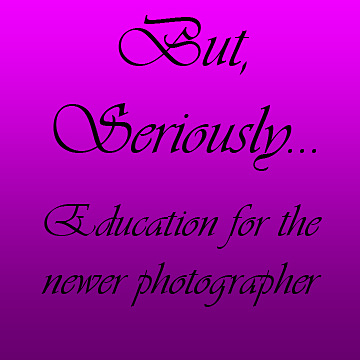Oh dear… I just read a post on Facebook about a 5 day photography shooting workshop and the organizer is using “refresh your portfolio” as part of the advertising mumbo jumbo.
My thoughts on this are no, no and hell, no.
Why?
Because when you go to a workshop you are in someone else’s studio, usually nicer than your own, with backdrops you don’t own, with lighting you don’t own, with models with cute clothes that you don’t know from Adam and with posing that you didn’t create.
No, no and hell no.
Do NOT, under ANY circumstances use ANY workshop images for your portfolio.
Why?
Because it’s wrong. Because you’re showing work that is not of your own creation. You are showing work that you could not replicate yourself (unless you are attending workshops beneath your ability).
You cannot ethically show images that you did not control all facets of. If your photography looks nothing like these workshop images, you are advertising falsely.
It’s a generally accepted practice within the photographic community to not use photographs taken during a class or workshop for your portfolio. Yes, some of these shots are totally awesome, but if there’s no way in Hades that you can re-produce these images, you are screwed. Don’t put your reputation at stake. Use these images as reference to guide you in changing the way you shoot.
Do not use them as proof that you currently shoot in that style. You don’t. The class instructor does. And you ain’t him.


I agree Christine. It is for this reason the PPA discourages work shop prints from being entered in to competition. It is, at best, a collaborative image when taken during a workshop. I know because I've taught workshops and seen some of the attendees post their images on their website and it is clear that they could never have done that on their own. Agree. Agree. Agree.
Several months ago I attended a workshop mainly for the styled shoot aspect of it – I really liked the location it was being held at (it was a two day workshop and I only went to part 2 – and arrived a couple hours after it began). The WS was comprised of many things I already knew, although I learned a few things about workflow. Then, we shot a faux-bride and groom outside in an awesome setting all from different perspectives. Would you apply that situation this to your post? (meaning would you consider this something you shouldn't use?) I blogged about it, stating it was a workshop and even posted behind the scenes photos. I do have some of the shots in my portfolio though – although my portfolio is also full of real weddings and shoots I've gotten on my own (not a "just starting out one") I'd just like your opinion – Thanks! : ) PS – I love your posts!
I think you have a bit of overkill on this one. First off, if it is a good workshop and you are learning something and the photo shows something that you have learned to do, then all is well. Especially when you have a workshop that invites you to freshen your portfolio. Your payment is helping to pay for cute models with cute clothing and interesting settings. Obviously if the workshop states that photos should not be used in your portfolio, that would be another matter. I would not show something that I was not confident that I could reproduce with another client, that would be the issue regarding something like this. If you are not confident that you can reproduce a look, I would agree that it should not be a part of your portfolio. JMHO
Going to disagree. I have only been to one workshop where *I* posed the model, set the lights and chose the location. Under those circumstances, I controlled every facet. All other workshops have had the lights set by the instructor, the model was directed by the instructor, etc etc. I do pull backs of these scenes for future reference, but as I did not control any facet of the shot, it is not a true representation of my work. This article is part of a series of articles aimed specifically at the brand new photographer and the advice is appropriate for that audience.
I agree with Peter on this one…